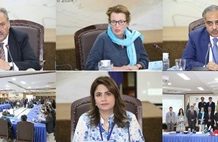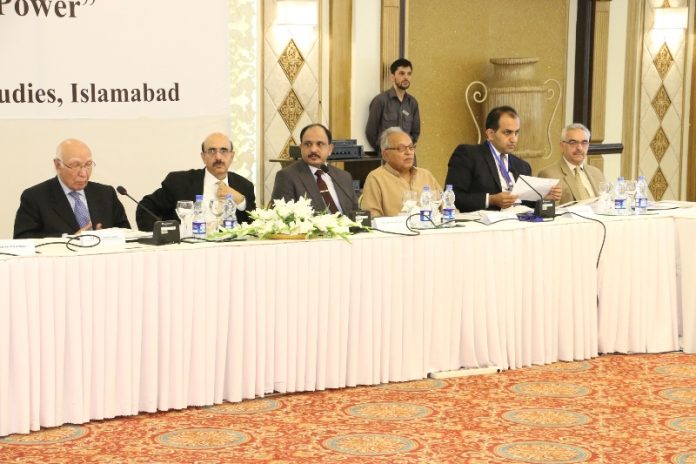Press Release
Seminar on Pakistan’s Soft Power
April 8, 2016
In this era of globalisation and emerging threats, Pakistan needs to develop and implement its “Soft Power” in order to get rid of most of its problems. Pakistan has suffered enormously because of its tarnished image, which was largely due to false propaganda by some international players. To counter this trend and to build a “Brand” and “Narrative” of Pakistan, we have to use our soft power. The real foundations of soft power are the rule of law and democratic institutions. This was stated by Mr. Sartaj Aziz, Advisor to the Prime Minister on Foreign Affairs, while inaugurating a seminar titled “Implementing Pakistan’s Soft Power” here in Islamabad on April 8, 2016. The seminar was organised by the Institute of Strategic Studies, Islamabad (ISSI).
Earlier, in his opening remarks, Ambassador Masood Khan, Director General ISSI, identified three functioning principles of soft power, namely culture, institutions and diplomacy. He also mentioned the countries which have successfully utilised the concept of soft power as an instrument of their respective national power. Noting that Pakistan had immense “Soft Power”, which had reached its peak in the 1970s when the country was a major tourist hub in the region. He identified various challenges, and presented a roadmap to augment Pakistan’s soft power in the region. These included; Project Pakistan as a sovereign, democratic, progressive and prosperous state, which is at peace with itself and others; constructing an image, at home and abroad, which instils hope, inspiration, goodwill and attractiveness. He suggested branding Pakistan as “Spectacular Pakistan” and “Shaandar Pakistan.”
The inaugural session of the Seminar was also addressed by Dr. Mukhtar Ahmad, Chairman, Higher Education Commission. Dr. Ahmad emphasised the need to impart quality education to our youth as the most efficient means to strengthen the country’s soft power.
Ms. Marvi Memon, Minster of State and Chairperson, Benazir Income Support Programme (BISP), in her keynote address said that BISP is a success story that caters for the 5.2 million of the poorest, and is ready to share its experiences with the global community. She highlighted that Pakistan is committed to financial empowerment of the women. Economic wisdom, she said, is linked with soft image.
During the three sessions of the seminar, a wide range of views were expressed by participants on issues related to the need of constructing a narrative for Pakistan’s soft power; how Pakistan can effectively project it and what are the next steps to promote Pakistan’s soft image across the globe. The participants of the seminar discussed issues related to the role of education, diplomacy, public perception, culture, connectivity, performing art, media, visual media, religion, knowledge economy, tourism, thinks tanks, youth and empowerment of women in promoting Pakistan’s soft image across the globe. The participants included Mr. Faisal Mushtaq, CEO Roots Millennium Schools, Dr. Ijaz Shafi Gilani, President GALLUP, Mr. Asghar Nadeem Syed, a renowned writer, Mr. Zahid Hussain, Journalist, Mr. Uxi Mufti, former Executive Director Lok Virsa, and Mr. Touqeer Nasir, former Director General PNCA, and a cross section of young scholars, media persons and representatives of other organisations.
Ambassador Khalid Mahmood, Chairman BoG ISSI, said that soft power is not a substitute for hard power, and a country’s power is a combination of both hard and soft power. Improving the image of Pakistan is not going to be an overnight process and requires patience and dedication.
Ambassador Masood Khan, in his concluding remarks said that the combination of hard and soft power is what knows as smart power. He said that Pakistan Foreign Office and Pakistani diplomats work very hard and their merits are recognised all over the world. He said that all participants have given very brilliant presentation and especially the voice of the young participants has taken over ownership to promote Pakistan’s soft power in future.
A cross section of people including people from media, academia, think tanks, ministries and armed forces attend the seminar. Ambassadors and representative of international organisations in Islamabad were also present at the occasion. Faculty and students from Roots Millennium School and University, National University of Modern Languages, National Defence University, Quaid-i-Azam University, and the Urdu University actively participated in the seminar.
Malik Qasim M. / Kashif M. / Ahmed S. /08042016












